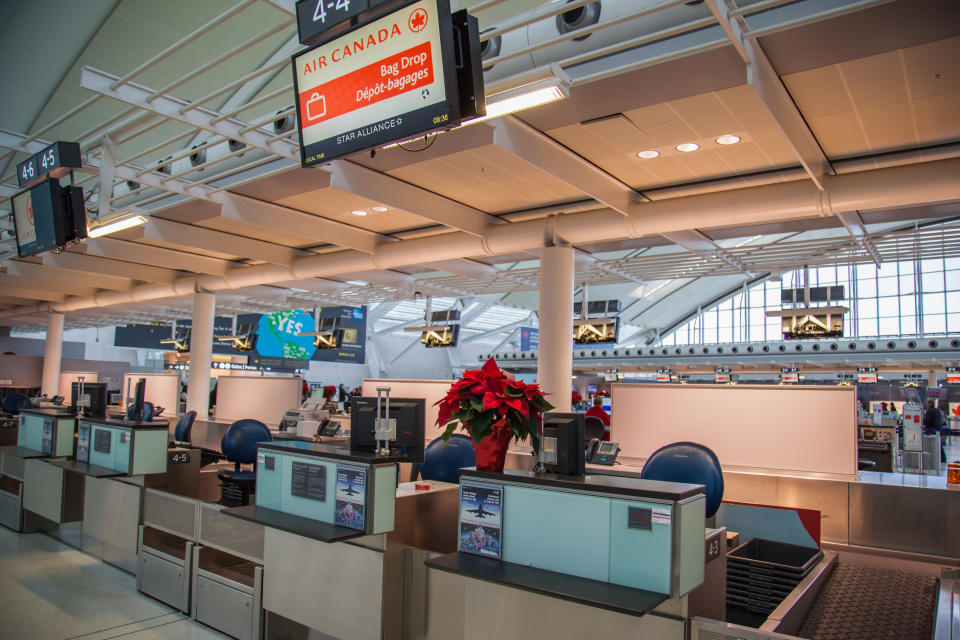Canada's air passenger rights go into effect today – here's what you need to know
As of Monday, Canadian airlines will have to compensate passengers for lost or damaged baggage and for bumping them off a flight as some of the long-awaited Air Passenger Protection Regulations go into effect.
The Canadian Transportation Agency’s (CTA) new regulations spell out what rights passengers have when it comes to delays, overbooking and cancellations.
The first set of regulations to go into effect on Monday include rules around clear communication, tarmac delays, the transportation of musical instruments, compensation for denied boarding, and lost or damaged baggage.
But those hoping to get compensation for delays or cancellations will have to wait until December 15, when the second set of regulations are implemented, including rebooking and refunding rules.
The new regulations, which have been in the works since the federal government’s Transportation Modernization Act became law last May, have been criticized by both passenger advocacy groups and airlines.
Gábor Lukács, founder of the advocacy group Air Passenger Rights, said in a statement that Canadian fliers are in for “a rude awakening” with the new rules and that the regulations undermine air passenger rights. Airlines, meanwhile, are asking the Federal Court of Appeal to quash the new rules, arguing the required payments violate international standards and should be considered invalid.
Here are the rules that go into effect today, and what it means for passengers.
Clear communication
The new rules will require that passengers are kept informed in the event of any kind of flight disruptions – whether it’s a delay, cancellation or a denial of boarding. When a flight is disrupted, airlines will have to notify passengers as soon as possible and provide regular status updates every 30 minutes.
The regulations also state that carriers must provide customers with a written notice featuring the standards of treatment and compensation guidelines under the Passenger Regulations, as well as directing passengers to the carrier or CTA’s website.
CTA chief executive Scott Streiner has said that communication was one of the most consistent themes raised by Canadians throughout the consultation process leading up to the implementation of the regulations.
“One of the things Canadians told us is that it’s not only important to have a clear and consistent set of right, but that it’s important to know what the rights are,” he told reporters at a new conference earlier this year.
“It lowers stress levels and allows everybody to figure out their next steps when they have real time communication on what’s happening during a flight delay.”
Up to $2,400 if you’re denied boarding
The rules also detail how much airlines will have to compensate passengers if they are denied boarding or bumped off a flight. First, airlines are required to ask all passengers if anyone would be willing to give up their seat in exchange for “mutually agreed-upon benefits” that must be provided in writing. If no one volunteers, passengers are entitled to up to $2,400 in compensation, depending on how long their arrival is delayed.
Less than six hours – $900
More than six hours, but less than nine hours – $1,800
Nine or more hours – $2,400
But the Air Passenger Rights group said that denial of boarding has been “defined narrowly” and will require passengers to prove that you were bumped.
“You will get compensation only if you have evidence that at the boarding gate, there were more passengers than the number of seats available on the aircraft, and that all this happened for reasons within the airline’s control and not due to maintenance issues,” the group said in a statement. “Good luck!”

Tarmac delays
The new passenger rules outline the standard of treatment in the event of tarmac delays (including access to working washrooms, proper ventilation, and food and drink provisions), and require that carriers provide the opportunity to disembark after three hours.
Whether the tarmac delay regulations are an improvement appears to depend on who you ask.
Lukács has said that the new rules double the amount of time an airline can keep you in an aircraft. He said that based on the legally binding 2008 Code of Conduct of Canada’s Airlines, airlines could only keep passengers on the tarmac for up to 90 minutes.
Transport Minister Marc Garneau has previously said that the 90-minute limit was “incorrect” and that there has been “misinformation” regarding tarmac delay rules.
“These regulations do not increase tarmac delays,” Garneau told reporters in May.
“Some airlines in the past have put in their tariffs that they would disembark after a specific amount of time, but that was individual decision by airlines. There has never been a regulation that specifies the amount of time.”
New baggage rules
Passengers will also be able to get money in the event that baggage is lost or damaged. The Air Passenger Protection Regulations extends the Montreal Convention rules, which sets the maximum liability for damages for lost, damaged or delayed baggage at $2,100. The regulations also require a reimbursement of any baggage fees.
The rules will also require airlines to set clear policies for the transportation of musical instruments, including safety restrictions and additional fees.
With files from the Canadian Press.

 Yahoo Finance
Yahoo Finance 
